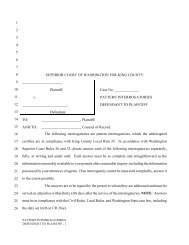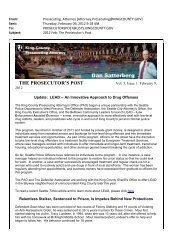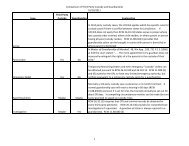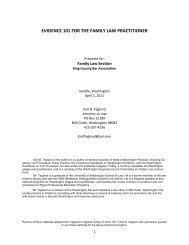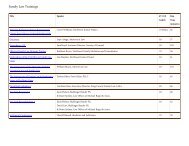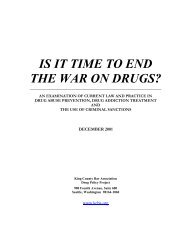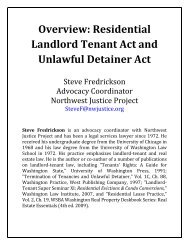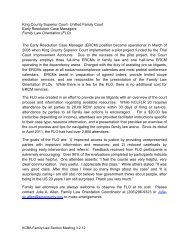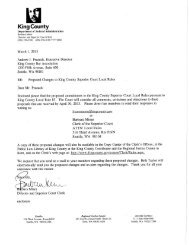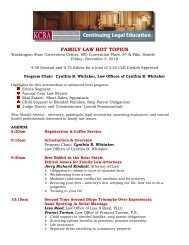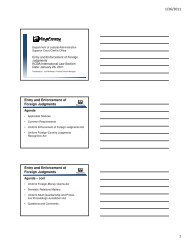Effective Drug Control: Toward A New Legal Framework
Effective Drug Control: Toward A New Legal Framework
Effective Drug Control: Toward A New Legal Framework
You also want an ePaper? Increase the reach of your titles
YUMPU automatically turns print PDFs into web optimized ePapers that Google loves.
intolerance toward recreational drug use. Constitutional concerns led the State<br />
Department to recommend that Congress impose a prohibition through a national ban on<br />
imported, non-medicinal smoking opium. 111 Section 11 of the Pure Food and <strong>Drug</strong> Act<br />
had already authorized the federal government to ban any imported drug deemed<br />
dangerous to the public’s health, but Congress went ahead and approved the Opium<br />
Exclusion Act in any event, on February 9, 1909. 112<br />
The Foster Antinarcotics Bill: Prelude to the Harrison Act<br />
Upon his immediate return from Shanghai, Hamilton Wright sought sweeping<br />
federal anti-drug legislation, to be founded upon Congress’ constitutionally granted<br />
taxing power, and he drafted just such a proposal. Representative David Foster of<br />
Vermont, chairman of the House Committee on Foreign Affairs, introduced Wright’s<br />
legislation in 1910. Known as the Foster Antinarcotics Bill, it called for a federal tax on<br />
all drug transactions in the nation and would have required all sellers of drugs to register<br />
with the government and to record and report all of their transactions.<br />
Supporters of the Foster Antinarcotics Bill appealed to popular fears and myths<br />
about racial minorities. 113 The interests opposed to the bill, however, including the<br />
nation’s drug manufacturers and retailers, opposed the bill for its cumbersome recordkeeping<br />
and reporting requirements and, since the public was not enthusiastically driving<br />
a national anti-narcotic movement, the arguments of business and industry carried their<br />
weight in Congress. Despite calls from Hamilton Wright and President Taft that the<br />
United States had to show the world that it “had its house in order” before the second<br />
International Opium Conference in the Hague in 1912, 114 the measure failed.<br />
The Harrison Narcotic Act of 1914 and its Interpretation<br />
Still resolved to see domestic drug prohibition enacted, Hamilton Wright had his<br />
legislation introduced in the next session. This time, Representative Francis Burton<br />
Harrison (D-NY), who himself had been Governor General of the Philippines from 1913<br />
to 1921, agreed to shepherd it through the House. The bill met again with strong<br />
opposition, especially from the American Medical Association, so the bill’s proponents<br />
reluctantly agreed to modify its record-keeping provisions, to reduce the penalties and to<br />
continue to allow the sale of patent medicines with small amounts of narcotics in them. 115<br />
After the grudging compromise of all parties, the result was the Harrison Narcotic Act of<br />
1914, a major watershed in the federal effort to regulate drugs. 116<br />
The Harrison Act required all manufacturers and purveyors of narcotics to register<br />
their activity with the federal government, to keep records of their sales and to pay a tax<br />
on each transaction. 117 Although ostensibly only a tax measure, the practical effect of the<br />
Harrison Act was to severely limit the availability of opium and cocaine for non-medical,<br />
recreational purposes. The bill was not presented as a prohibitionist measure in reaction<br />
to domestic morality concerns; rather, the congressional debate focused on comporting<br />
with international treaty obligations imposed by the Hague Opium Convention of 1912. 118<br />
In only a few short years, however, the Harrison Act was transformed from a relatively<br />
innocuous revenue measure into a powerful tool for federal authorities to regulate, and<br />
ultimately prohibit, a wide range of narcotics-related activity.



